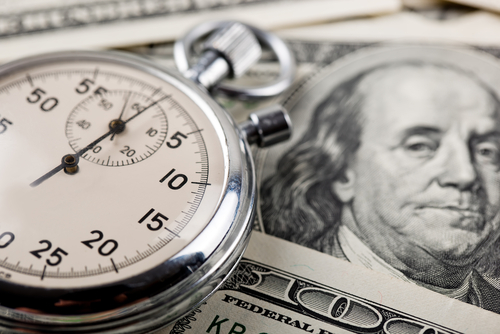Benjamin Franklin famously wrote that “time is money.” But time is also much, much more than that. And focusing more on time can make a world of difference in terms of our happiness, well-being and sense of purpose.
Franklin’s entire quote, from an essay titled “Advice to a Young Tradesman,” goes…
Remember that time is money. He that can earn ten shillings a day by his labour, and goes abroad, or sits idle one half of that day, tho‘ he spends but sixpence during his diversion or idleness, ought not to reckon that the only expence; he has really spent or rather thrown away five shillings besides.
That is excellent advice when our goal is solely about money – when we’re in a financial crisis, when we’re saving for something meaningful or when we need to make sure our income is covering our outflow.
However, it’s not good advice when our goal is to increase our overall happiness and well-being.
Having some amount of security is necessary for us to even be able to think about our quality of life. But beyond a certain point, focusing on finances actually undermines our happiness.
We usually think of affluence in terms of money, but there’s a tremendous benefit to having an affluence of time.
Think about how you feel when you’re pressed for time. I think you’ll recognize the following effects. When we’re short on time…
- It’s difficult to stay present in the moment. That means we’re unlikely to be effective at anything that requires concentration – creative work, self-reflection or our relationships.
- We’re less likely to help others. In one study of seminary students, those who had to hurry to get to their next destination were more likely to pass a person in obvious distress than those who felt they had extra time.
An interesting finding is that earning more money increases happiness… up to a point. Beyond a certain income level, however, making more money doesn’t increase our happiness very much.
This may be in part because of one of the strange things about money and time: When we make more money, we actually feel that we have less time.
You would think it would be the other way around. After all, if we’re earning a higher wage, that means we can work less and still make the same amount of money. We should feel like we have an abundance of time.
But that’s not what happens. As we make more money, we come to think of our time as more valuable. So when we have free time, we may think of it as time away from the wages we could be racking up.
Simply feeling that our time is worth more money makes it seem more scarce.
In fact, most people today feel that they have less free time than they had in the past – even though Americans have about four more hours of leisure time today than they did in the 1960s.
We can counteract this effect by purposefully focusing on how we spend our time.
For example, when we give our time away in the form of volunteer work or simply helping a friend, it can make us feel like we have an abundance of time. Research has shown that when people volunteer to help others, even for as little as 15 minutes, they feel that they have more time in their lives.
An interesting effect also comes up when we pay for time-saving devices or systems.
When we pay someone else to take care of things we genuinely dislike, it frees up more time for us to do things we enjoy. Saving time by buying gizmos like Roombas to take care of household chores – or by delegating our busywork to someone else – can improve our quality of life.
But when we pay for something primarily to make our time use more efficient, we can end up feeling worse. For example, when people were asked to think of the last time they ate at a fast-food restaurant, they reported an increased desire for other time-saving products. In fact, just seeing fast-food logos makes people more impatient – it stimulates our sense of time scarcity.
We also often trade time in order to save small amounts of money. Like driving to a gas station farther away to save a couple of dollars on gas, taking flights with layovers instead of paying $100 more for a direct flight, or spending hours shopping for a bargain that will save us a few dollars. When we focus on how we spend our money, without including the cost of time, we can get drawn into believing that both time and money are scarce.
In contrast, when we focus on how we spend our time, we feel more connected to our sense of self. This allows us to focus more easily on happiness and relationships.
We need to manage both time and money to function well in the world, but it’s very easy to get stuck thinking about only the latter.
If you’re feeling short on time and money, try shifting your attention toward how you spend your time. Pay attention to the activities that bring you joy, love and fulfillment… as well as those that bring you stress, anxiety and impatience.
Here’s a simple formula to increase your happiness: Spend less time commuting, watching TV, and being on your phone or the web, and spend more time interacting with people.
Money is a valuable asset. But time is too, and appreciating it daily is one of the best ways to improve our well-being.
[Editor’s Note: Sign up to receive Joel’s weekly blog.]
